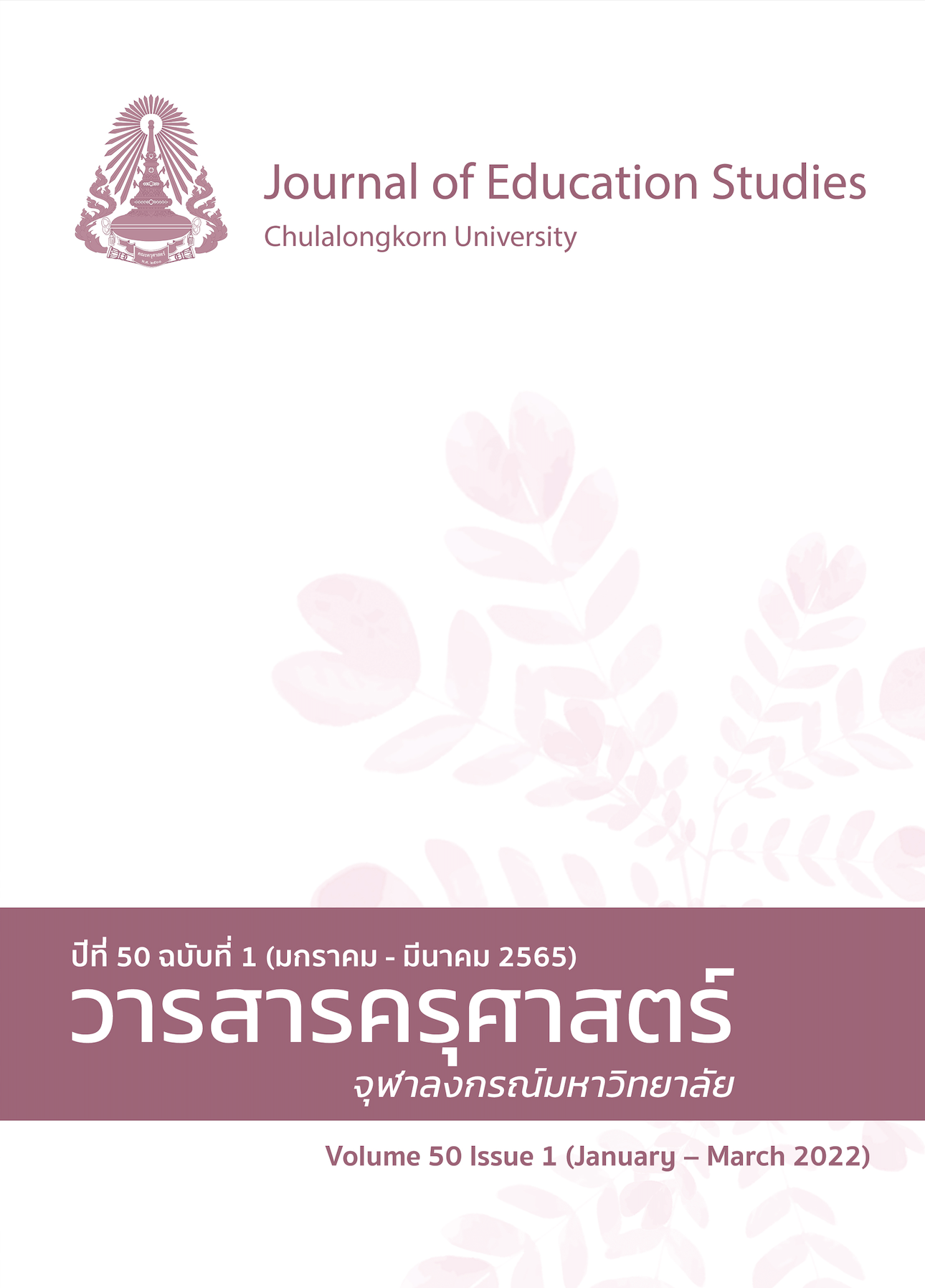A Factor Analysis of Cross-Cultural Competence of Teachers Under the Bangkok Metropolitan Administration
DOI:
https://doi.org/10.14456/educu.2022.10Keywords:
cross-cultural competence, confirmatory factor analysis, teachers under Bangkok metropolitan administrationAbstract
The purposes of this study were (1) to analyze the factors of cross-cultural competence of teachers under the Bangkok Metropolitan Administration (BMA) and (2) the levels of cross-cultural competence of teachers under study. The sample of 324 teachers from schools under the BMA was compiled by using multi-stage random sampling. The research instrument used in the study was a cross-cultural competence test of the teachers with a reliability at 0.95. The data were analyzed with descriptive statistics and second-order confirmatory factor analysis. The study found that the factors of cross-cultural competence of the teachers under the BMA comprised of three components: cultural awareness, knowledge, and understanding of culture and personal skills. The results of second-order confirmatory factor analysis of measurement model of cross-cultural competence of the teachers under BMA had goodness-of-fit with the empirical data ( (14, N=324) = 21.92; p = 0.08; GFI = 0.98; AGFI = 0.96; RMR = 0.01; RMSEA = 0.04). Once the factors of cross-cultural competence of the teachers under the BMA were considered, cultural awareness had the highest factor loading of all components, followed by cultural knowledge and understanding culture, and personal skills. Overall, the level of cross-cultural competence of teachers under BMA was at a high level (average = 4.09, standard deviation = 0.37).
References
ภาษาไทย
กมลชนก ชำนาญ. (2556). การพัฒนาแบบวัดและการวิเคราะห์ระดับความสามารถทางวัฒนธรรมของครู [วิทยานิพนธ์ปริญญามหาบัณฑิต, จุฬาลงกรณ์มหาวิทยาลัย]. Chulalongkorn University Intellectual Repository (CUIR). http://cuir.car.chula.ac.th/handle/123456789/43874
กระทรวงศึกษาธิการ. (2553). พระราชบัญญัติการศึกษาแห่งชาติ พ.ศ. 2542 แก้ไขเพิ่มเติม (ฉบับที่ 2) พ.ศ. 2545 และแก้ไขเพิ่มเติม (ฉบับที่ 3) พ.ศ. 2553. โรงพิมพ์คุรุสภาลาดพร้าว.
กองการเจ้าหน้าที่ กรุงเทพมหานคร. (2561). สถิติกรุงเทพมหานคร : จำนวนครู. http://www.bangkok.go.th/bangkokeducation/page/sub/ 11493/พ.ศ.2561
โกเมศ สุพลภัค. (2555). การรับรู้และการสื่อสารเพื่อการจัดการความหลากหลายทางวัฒนธรรมของบริษัทข้ามชาติในประเทศไทย [วิทยานิพนธ์ปริญญามหาบัณฑิต, จุฬาลงกรณ์มหาวิทยาลัย].Chulalongkorn University Intellectual Repository (CUIR). http://cuir.car.chula.ac.th/handle/123456789/37786
จิราภา เต็งไตรรัตน์. (2554). จิตวิทยาทั่วไป (พิมพ์ครั้งที่ 7). สำนักพิมพ์มหาวิทยาลัยธรรมศาสตร์.
ชุตินันท์ จันทรเสนานนท์. (2553). การพัฒนาแบบวัดสมรรถนะเชิงวัฒนธรรม สำหรับนักเรียนชั้นมัธยมศึกษา [วิทยานิพนธ์ปริญญาดุษฏีบัณฑิต, จุฬาลงกรณ์มหาวิทยาลัย]. Chulalongkorn University Intellectual Repository (CUIR). http://cuir.car.chula.ac.th/handle/123456789/21291
ณิชาภา จันทร์เพ็ญ. (2555). การพัฒนาตัวบ่งชี้และสมรรถนะข้ามวัฒนธรรมของครู : การทดสอบความไม่แปรเปลี่ยนของการวัดตามภูมิหลังของครู [วิทยานิพนธ์ปริญญามหาบัณฑิต, จุฬาลงกรณ์มหาวิทยาลัย]. Chulalongkorn University Intellectual Repository (CUIR). http://cuir.car.chula.ac.th/handle/123456789/45043
สถาบันพัฒนาข้าราชการกรุงเทพมหานคร. (2562). แผนพัฒนาข้าราชการกรุงเทพมหานครและบุคลากรกรุงเทพมหานคร ปีงบประมาณ พ.ศ. 2562. (ม.ป.ท.).
สำนักการศึกษากรุงเทพมหานคร. (2559). แผนพัฒนาการศึกษาขั้นพื้นฐานกรุงเทพมหานคร ฉบับที่ 2 (พ.ศ. 2560 - 2563). ชุมนุมสหกรณ์การเกษตรแห่งประเทศไทย.
สำนักงานสถิติแห่งชาติ. (2563). การสำรวจการย้ายถิ่นฐานของประชากร พ.ศ. 2562. กองสถิติพยากรณ์.
สำนักยุทธศาสตร์และประเมินผล กรุงเทพมหานคร. (2556). วิสัยทัศน์กรุงเทพฯ 2575 : กรุงเทพฯ มหานครแห่งเอเชีย Bangkok: Vibrant of Asia. ชุมนุมสหกรณ์การเกษตรแห่งประเทศไทย.
สิริอร วิชชาวุธ. (2554). จิตวิทยาการเรียนรู้. สำนักพิมพ์มหาวิทยาลัยธรรมศาสตร์.
สุจิตรา โซ่พิมาย. (2559). การพัฒนาตัวบ่งชี้สมรรถนะเชิงวัฒนธรรมของนักเรียนระดับชั้นมัธยมศึกษาตอนปลาย สังกัดสำนักงานเขตพื้นที่การศึกษามัธยมศึกษา เขต 20 (อุดรธานี) [วิทยานิพนธ์ปริญญามหาบัณฑิต, มหาวิทยาลัยมหาสารคาม] . http://khoon.msu.ac.th/fulltextman/full4/sujitta11402/titlepage.pdf
สุรางค์ โค้วตระกูล. (2553). จิตวิทยาการศึกษา (พิมพ์ครั้งที่ 9). สำนักพิมพ์จุฬาลงกรณ์มหาวิทยาลัย.
อมรา พงศาพิชญ์. (2547). มนุษย์กับวัฒนธรรมในสังคมและวัฒนธรรม (พิมพ์ครั้งที่ 9). โรงพิมพ์แห่งจุฬาลงกรณ์มหาวิทยาลัย.
อัชรา เอิบสุขสิริ. (2556). จิตวิทยาสำหรับครู. สำนักพิมพ์แห่งจุฬาลงกรณ์มหาวิทยาลัย.
ภาษาอังกฤษ
Balcazar, F. E., Suarez-Balcazar, Y., & Taylor-Ritzler, T. (2009). Cultural competence: Development of a conceptual framework. Disability & Rehabilitation, 31(14), 1153-1160.
Ford, D. Y., & Whiting, G. W. (2008). Cultural competence: Preparing gifted students for a diverse society. Roeper Review, 30(2), 104-110.
Hair, J. F., Black, W. C., Babin, B. J., & Anderson, R. E. (2014). Multivariate data analysis: Pearson new international edition (7th ed.). Pearson Education Limited.
Marcy, P. D. (2000). Psychology of learning for instruction (2nd ed.). Allyn & Bacon.
McKoy, C. L. (2006). Pre-service music teachers multicultural awareness exposures and attitudes: A preliminary study. Southern Music Education Journal, 2(1), 78-94.
Smith, P. (2004). Speaking out on assessment of multicultural competences and outcomes: Some cautions.
[Paper presentation], National Conference of Multicultural/Diversity Outcomes. Kansas City, USA.
Downloads
Published
How to Cite
Issue
Section
License

This work is licensed under a Creative Commons Attribution-NonCommercial-NoDerivatives 4.0 International License.




